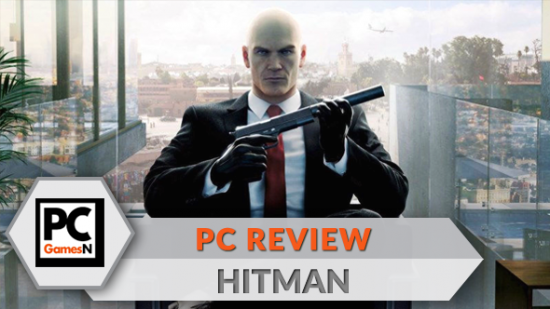Glasses clink and fashionistas shmooze in the courtyard of a Parisian mansion, in which an exclusive catwalk show is being hosted by morally bankrupt meatbags. You’re surveying the scene from a grand corridor, all polished floors and chandeliers. You pat your suit pockets and feel a garrote, a silenced pistol, a coin, some emetic rat poison, a wrench, a kitchen knife, a screwdriver, a lockpick, two keys, a modern lethal syringe and a priceless bust. You’re not going to use any of them.
Like to frolic around in a good PC sandbox? Here’s some more.
Instead, you’ve constructed a plan so elaborate you can barely hold it all in your mind at once. It involves stealing a lighting technician’s clothes to get a remote control that sets off some fireworks, which will lure both your targets from their interior locations to balconies on top of one another. While Dalia Margolis saunters outside to observe the pyrotechnics, you’ll sneak up behind her and push her over the edge – killing your second target, Viktor Novikov, as she lands.
In other words: with Hitman, Io have arrived at the most sophisticated assassination sandbox the franchise has ever seen, nostalgia for Contracts and Blood Money be damned. The puzzle box levels that were so sorely missing in the last series entrant are back haven’t just returned – they’ve returned in such fine form that you begin to wonder whether Hitman: Absolution wasn’t just a bad dream you had.
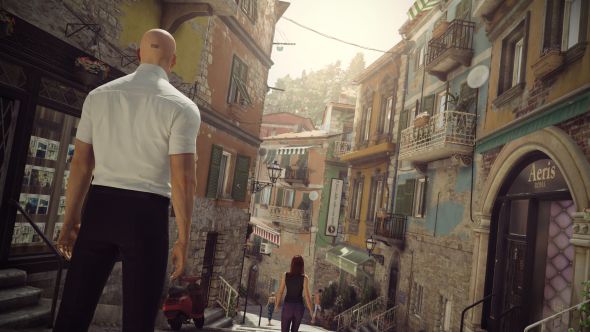
And they did it all while making an inarguable success of the episodic delivery model everyone decided they hated when it was first announced. Which is a big deal, because lesson one of Games Industry 101 is that developers of big, successful franchises don’t take gambles. The few who’ve tried have found themselves naked and shivering, bracing against a gale-force wind of Twitter notifications with tears in their eyes as they to mitigate the humiliating catastrophes they’ve somehow become embroiled in. And why? Because somebody, somebody, at that pre-production meeting three years ago said this one should go for the eSports crowd, or change a main character’s voice actor.
And yet Io’s gamble has paid off. The episodic delivery structure of Hitman dictated a slower-paced playthrough than many players would have liked when the opening Paris episode released. By the time episode six landed though, Elusive Targets, Escalation Contracts and the sheer cornucopia of assassination options in each level had changed the way you play Hitman. You weren’t just savouring a level because the next one hadn’t been released yet, you were doing so because the depth on offer demands to be savoured.
At first glance, those live game modes – Elusive Targets and Escalation Contracts – might seem like filler, designed to wring a bit of extra playtime out of the currently available content. And in less stark terms that must have been at least partial inspiration for their conception, but the reality is that they force you to play Hitman in yet another different way, and there’s a thrill to that. A very real thrill, if you’ve just unloaded your Silverballer into a target you know you’ll only ever get one chance to assassinate, and a nearby guard suddenly goes on alert.
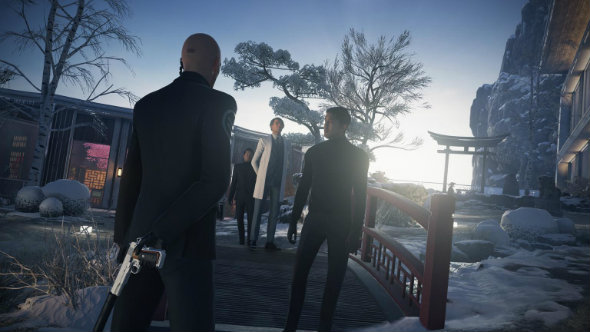
The clever stuff like those live modes and elaborate player-constructed deathtraps wouldn’t count for much if the fundamentals weren’t intact, though. The foundation for everything that works in this game is AI. It is, as it should be in any good stealth game, readable, predictable and consistent. NPCs and enemies signpost their states so explicitly, in fact, that it’s actually a bit disconcerting the first couple of times you play Hitman and hear them vocally cycle through their protocols.
Previous iterations in the franchise have kept their populations stoically silent and poker-faced until the moment they tip over the edge into combat, and the decision made by Io’s developers to take the guesswork out of their AI’s alert states and the effectiveness of your disguise has a major effect, tonally and mechanically. 2016’s Hitman feels less oppressive than anything that came before it, because you have a degree of certainty at any given time as to what the effects of your actions will be. You know whether your disguise is working, you know which guards to avoid while wearing it, and you know how alert those guards are right now.
Because of that, you naturally feel much braver to experiment within the sandbox. Sapienza could be just as sprawling and bristling with opportunities, but if the game’s systems didn’t give you such a clear understanding of what you can get away with and when, it’d be absolutely no fun to play.
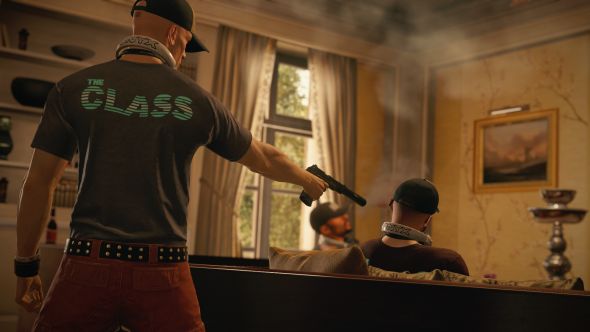
There is a trade-off at play here, though I think Hitman’s developers were right to arrive where they did on it. The explicit presentation of all game systems encourages you to manipulate people and environments, but it does have an effect on immersion and tone. When I think back to my personal favourites in the series – The Meat King’s Party and Beldingford Manor from Contracts, Curtains Down in Blood Money, and the original game’s Lee Hong Assassination – I remember how dark and dirty they felt, and how strongly I felt I was trespassing in them.
It’s hard to feel that same inherent wrongness about being in a particular location when you have so many indicators relaying information to you, and reminding you that you’re in a videogame. No, it’s all a bit helpful for that.
The holiday brochure locales that comprise most of Hitman’s six episodes are a tonal departure, too. Colorado and Hokkaido do arrive at a sense of atmosphere that feels consistent with previous games and Paris sits somewhere in the middle, but when you’re soaking the sunshine into your razored scalp in Sapienza, Marrakech and Bangkok, it’s hard to shake the sense that this all feels… quite nice. Quite comfortable.
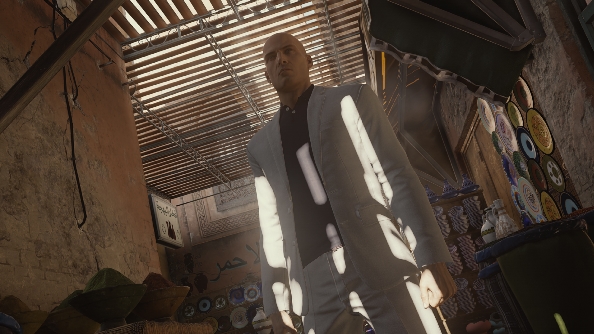
It’s fun to be empowered and surrounded by beauty, just as it’s fun to feel like you’re in over your head in strange and hostile territory, so really how you feel about the tonal effect of Hitman’s six-episode globe-trot will come down to personal taste. As such, it’s the faintest of criticisms to say I personally found it lacking in atmosphere.
That’s a separate argument to saying it lacks anything visually, you understand. It creates a sense of place perfectly well with the verticality of each location, the sheer size and population of them, and in the fidelity of tiny details such as fabrics and foods. The market corridor full of lamps in Morocco is a great example of visual fidelity (in this case, the impressive lighting engine) and art direction (expressed here via strong visual signifiers of place) knitting together to form an indelible moment of virtual tourism. Those scenes are fighting hard against the all-English language voice cast, of course, but if you can square away a busy North African outdoor market bustling with cockney accents the scenery is yours to enjoy.
With the scene set, the AI tuned to coax you into manipulating it this way and that, and the UI emboldening you to hatch ambitious plans within each sandbox, the final element that turns Hitman into such an engaging game on a fundamental level is the polish. Specifically, the polish of each bespoke animation, the collision detection and physical properties of each item. Contracts and Blood Money did the sandbox thing almost as well as 2016’s Hitman a decade earlier, but as you watched Agent 47 inadvertently moonwalk around and garrote the air six inches from your target’s neck in that inimitable style of his, hand on heart you knew something was up with the physics even then.
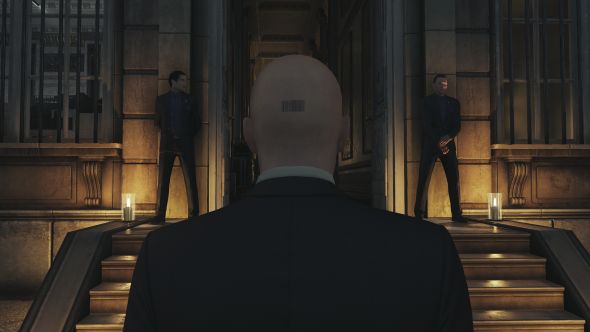
It’s that sense of physicality you get from moving around and interacting with (asphyxiating) people that sells the sense of purpose to you. As with Hitman’s AI, the consistency of your physical interactions makes you bolder, more likely to contrive some far-fetched kill. And that, like I need even say it, is the exact point of a Hitman game. You could just run in and shoot everyone, but you don’t. Not ever.
Six episodes wouldn’t usually be considered a lengthy campaign, but here’s another tradeoff: they’re the six densest, most detailed episodes you could have imagined. Would it have been better to release, say, eight episodes that never reached Sapienza’s scale but instead took 47 to more locations and presented him with more targets? It’s up for debate. In any case, we can be very happy with what we’ve got. Months after it was released, there are things I’ve still yet to try in Paris, let alone its subsequent content drops. I’m not usually much of a completionist, but Hitman’s structure gets under your skin.
New item and clothing unlocks, pickup locations and starting points change the possibilities of each level dramatically. What might have seemed impossible the first time you played Hokkaido, with not even a coin to chuck at anyone, becomes achievable in two minutes flat once you gain the privilege of starting undercover. The impossibly hostile Colorado becomes a playground like all the others once you’re able to start in disguise and packing heat (coins).
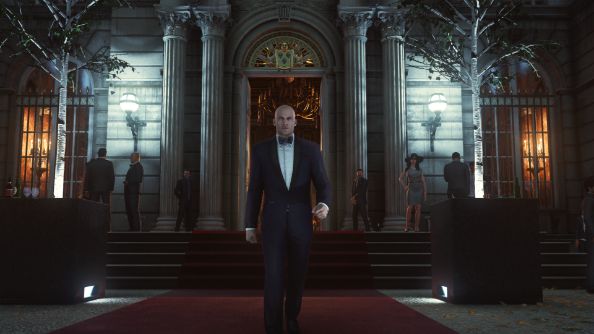
Occasionally all the iterating, mental cartography and item-unlocking are all building towards an absurdly simple solution: starting undercover in the vicinity of your target and elegantly poisoning their drink before slipping away. Or, in the case of many user-created Contracts, simply slinking into a hotel room and drowning a stranger in their own toilet in under a minute for leaderboard kudos. It feels great to skip the usual Machiavellian foreplay and get the job done so briskly, because it sells how fragile life is in Hitman’s world. Everyone’s just an ill-fated bathroom trip or sniper bullet away from the long goodbye, Agent 47 included.
Escalation Contracts pull the game in another direction still, showing you how the impossible becomes possible once you become familiar enough with a certain sequence of events. Here 47 becomes Bill Murray in Groundhog Day, if it were directed by Michael Haneke. Escalation level one of a particular Paris contract might have you taking out an NPC with a pistol while wearing a security guard disguise. Once that’s complete, you’ll need to suss out how to do it again, this time wearing the disguise for no more than 60 seconds. Oh and the security guard is a few minute’s walk from your target. And after completing that, you’ll need to do it all again while this time unicycling across a tightrope and juggling lethal syringes without being spotted – well, you get the idea. They’re a challenge for the veteran assassin who thinks they know a level inside and out, and they slowly teach a deeper understanding of the intricate clockwork timings in each area and NPC routine.
But you know about all this, because like me you’ve been playing Hitman for the better part of a year now. We’re all very well versed in its qualities. We even put it forward as one of our games of 2016. It’s only now that the boxed copy version has released though, which means a couple of things. Firstly, everyone who nailed their colours to the mast in stern caps-lock forum posts about its episodic structure and vowed not to touch the game until ‘IO actually finish it’ can now quietly go and play it without losing face. Secondly, there’s an additional bonus mission and ‘professional’ difficulty to expand the game still further, and they’re available both to season pass owners and those with boxed copies.
Landslide, the third bonus mission IO have released so far, takes place in a slightly reconfigured Sapienza and puts a hit out on a local mob boss with more than a passing resemblance to Godfather 3-era De Niro, cheek mole and all. At the beachside there’s a concert going on, and a crowd gathered in the town square to take in the singer’s operatic tones through the PA. Prior knowledge of Sapienza’s layout pays dividends, but at the same time enough has changed here that the hit doesn’t feel like an Elusive Target; you’re treated to new opportunities, disguises and areas here. Professional difficulty is unlocked after hitting level 20 in a certain location, and changes the game in numerous Draconian ways. Disguises that you bloody by killing the wearer can no longer be used; targets’ routes and behaviours are changed up; doing something naughty on camera will alert all and sundry; AI is generally more observant; you’re allowed just one save. It’s not for me, Clive, but the hardcore will enjoy a new level of challenge.
Developers, publishers, PR people and marketers have been talking about ‘games as platforms’ in their beanbag-scattered meeting rooms for years now, and usually it amounts to a base game with a carefully calculated quality level that just about entices people to buy additional DLC. With Hitman, though, you can see that concept realised as something positive: Square Enix and IO created a working framework into which substantial new chunks of content can be added in a meaningful way, and it’s monetised sensibly. Generously, even. Paired with a robust foundation of stealth game mechanics and imaginative sandbox design, it’s a model that other franchises should be envious of. And most importantly, a game that offers enjoyment on a grand scale. Hitman wants to keep you playing not because its ‘platform’ depends on it, but simply because it has so many party tricks to show you.
